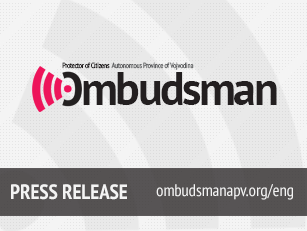 The Provincial Protector of Citizens - Ombudsman (PPCO) most strongly condemns attacks on bakeries in Sombor and Stara Pazova owned by citizens of Albanian ethnicity and demands from the police to identify the perpetrators and provide security and protection of the rights, freedom, personal integrity and property of all citizens of Serbia.
The Provincial Protector of Citizens - Ombudsman (PPCO) most strongly condemns attacks on bakeries in Sombor and Stara Pazova owned by citizens of Albanian ethnicity and demands from the police to identify the perpetrators and provide security and protection of the rights, freedom, personal integrity and property of all citizens of Serbia.
PPCO expresses its fear that these happenings might be linked to the happenings at the European Championship qualifications football match between Serbia and Albania. At the same time, PPCO hopes these events will not affect good inter-ethnic relations in Vojvodina in a detrimental way.
The Provincial Ombudsman invites all civic and political actors to take the side of tolerance and acceptance of diversity as foundations of all human rights clearly and unambiguously.
Read more: Provincial Ombudsman Condemns Vandalism
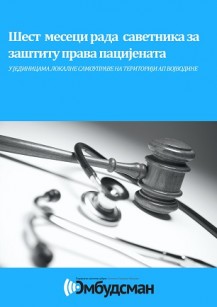 The newest survey of the Provincial Protector of Citizens - Ombudsman (PPCO) conducted on the first six months of work of the patients' rights protection advisors in the local self-government units in the Autonomous Province of Vojvodina (APV) indicates that patients' rights exercise is compromised, primarily by their lack of competence and healthcare related legal expertise.
The newest survey of the Provincial Protector of Citizens - Ombudsman (PPCO) conducted on the first six months of work of the patients' rights protection advisors in the local self-government units in the Autonomous Province of Vojvodina (APV) indicates that patients' rights exercise is compromised, primarily by their lack of competence and healthcare related legal expertise.
One of the most concerning data is that all advisors, except one, have already been employed with the local self-government prior to their appointment to their present post. This means that their new appointment only added healthcare issues to the list of their daily legal professionals' activities, without providing them with sufficient training or knowledge in this highly expert field. Most of them have attended a one-day's training, while four of them had no training whatsoever. This raises serious suspicion regarding the fulfillment of the proscribed condition that such an advisor must have substantial knowledge and expertise in handling healthcare related legal issues.
Read more: Healthcare: Patients' Rights Exercise Compromised
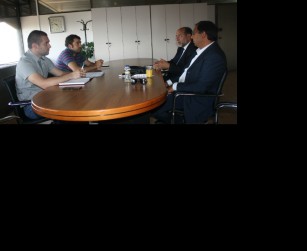 The Provincial Ombudsman institution expresses its concern regarding the information on the Roma National Minority Council website obliging Roma students wishing to enroll high schools, colleges and universities based on the special measures program to annex a formal document proving that they have been enrolled in the special voters’ list.
The Provincial Ombudsman institution expresses its concern regarding the information on the Roma National Minority Council website obliging Roma students wishing to enroll high schools, colleges and universities based on the special measures program to annex a formal document proving that they have been enrolled in the special voters’ list.
The website says this document is required in order for students to prove that they are members of the Roma ethnic minority. If they fail to do so, their application will be dismissed as incomplete.
The Serbian Constitution grants free expression of one’s ethnicity. Expressing one’s ethnicity is thus entirely voluntary, done on one’s own behalf and it can be withdrawn or changed at free will. Furthermore, the National Minority Councils Law proscribes that the special voters’ list is an official record of the ethnic minority members with a voting right. It also says that it is forbidden to use data from this list for any other purpose than exercising one’s voting rights, unless otherwise ruled by law. Since no other law proscribes any use of these data or the list containing them, there is no legal ground for the Roma National Minority Council to restrict or condition the exercise of any other rights of any Roma by requesting a formal document proving that they are on the special voters’ list.
Read more: Asking Future Students to Prove Their Ethnicity
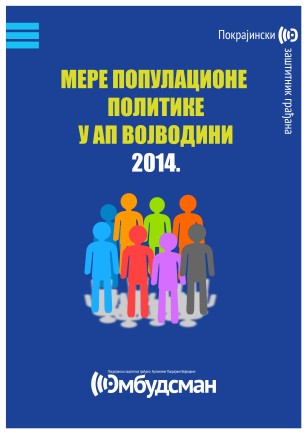 The most recent study paper of the Provincial Ombudsman concerning the population policies and their implementation on the local self-government level indicates that the local authorities, despite their broad jurisdiction in this field, lack strategic approach to it.
The most recent study paper of the Provincial Ombudsman concerning the population policies and their implementation on the local self-government level indicates that the local authorities, despite their broad jurisdiction in this field, lack strategic approach to it.
The APV Demographic Development Program, a document devised and approved by the authorities of the Autonomous Province of Vojvodina, perceives local self-governments as having a major role and activity potential in this field. Concerning the position and role of local self-governments in any political system, the most burning issue of immediate interest to the local population is its reproduction. On the other hand, the state population policy measures are general by their nature and implemented uniformly on its entire territory. Effective population policies implementation means complementing the general measures with those of the local authorities, as well as providing local funding. This is why the local self-government is the place where the specific parent’s needs are best identified and where the mechanisms for meeting those needs could be put to their best use within the limits of the local authorities jurisdiction and competences.
 The Provincial Ombudsman supported the Hate Free Zone event held on 27 June, the World Pride Day. The event was organized by a pool of local NGOs active in the LGBT field and wishing to point out the existing intolerance towards members of the LGBT population and other vulnerable social groups.
The Provincial Ombudsman supported the Hate Free Zone event held on 27 June, the World Pride Day. The event was organized by a pool of local NGOs active in the LGBT field and wishing to point out the existing intolerance towards members of the LGBT population and other vulnerable social groups.
LGBT population is one of the most vulnerable social groups facing marginalization, discrimination, hate speech, bullying, threats and homophobic violence day-to-day. The situation worsens as their visibility increases, holds the Provincial Ombudsman.
LGBT discrimination, hate speech and violence cases are mostly misprocessed. The police, public prosecutor’s offices and courts are also extremely slow and inefficient when handling violence against LGBT people. This population is often discriminated and harassed at work, where their employers fail to undertake any measures to protect them from discrimination. The position of LGBT population is reflected in the fact that it is the only social group disputed its right to public assembly, despite the fact that it is granted by the Constitution.
Read more: LGBT Discrimination: Hate Speech and Violence Misprocessed
 This year, primary and secondary schools have continued with the malpractice of conditioning student enrollment and issuing of education related documents with (non-)payment of the so-called ‘students’ fee’. This is a recurring issue still with no systemic solution and no prospects of resolution yet.
This year, primary and secondary schools have continued with the malpractice of conditioning student enrollment and issuing of education related documents with (non-)payment of the so-called ‘students’ fee’. This is a recurring issue still with no systemic solution and no prospects of resolution yet.
Attending schools within the state education system in Serbia is free of charge. However, there is a general informal consensus that parents would contribute a certain amount towards some of the costs voluntarily. Unfortunately, due to rising poverty, more and more parents are not in a position to contribute even this minimum. Some of these parents addressed the Provincial Ombudsman claiming that their children are facing unequal treatment as a result of it, esp. concerning their enrollment.
The Provincial Ombudsman would hereby like to draw public attention to the fact that an explication request asking for their position concerning the parents’ claims mentioned above was sent to all the sub-regional Education Management Authorities (EMA) in the Autonomous Province of Vojvodina back in 2013.
Read more: Education: Regulate the ‘Students’ Fee’ Definitely
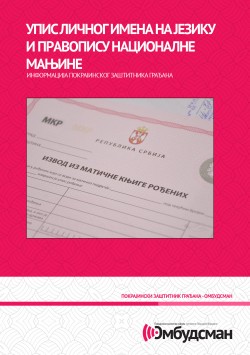 One of the national minority rights is freedom of their members to choose their own name according to the cultural and ethnic particularities of the ethnic minority they belong to, as well as the right to use it in the private and public sphere. Should the members of the ethnic minority communities wish to, exercising this right implies, amongst other things, a possibility to have their own and the names of their children registered in their native language and script within the birth and other official records with the Notary Public Offices.
One of the national minority rights is freedom of their members to choose their own name according to the cultural and ethnic particularities of the ethnic minority they belong to, as well as the right to use it in the private and public sphere. Should the members of the ethnic minority communities wish to, exercising this right implies, amongst other things, a possibility to have their own and the names of their children registered in their native language and script within the birth and other official records with the Notary Public Offices.
Registering national/ethnic minority community members’ names in their native language and script within the birth records is a precondition for exercising other aspects of national minority rights (e.g. using their original name in private and public life, in ID cards, passports, etc.). This is also one of the rights pertaining to preservation of the ethnic identity and cultural specificities of a minority group. In Serbian legislation this right is regulated by several laws and other regulations.
Read more: Notary Public Offices: Uniform Proceedings Required
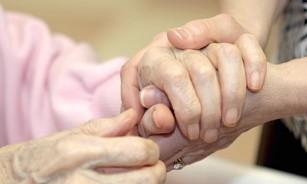 According to the 2013 data, there are 48 state-run homes for the elderly in the Republic of Serbia. Besides the duly registered nursing homes founded and run by individuals as private welfare enterprises, there are also a number of illegal ones, the capacities of which are still unknown.
According to the 2013 data, there are 48 state-run homes for the elderly in the Republic of Serbia. Besides the duly registered nursing homes founded and run by individuals as private welfare enterprises, there are also a number of illegal ones, the capacities of which are still unknown.
Visiting elderly and nursing homes run as private enterprises and duly registered with the relevant authorities of the Autonomous Province of Vojvodina, the Provincial Ombudsman has determined that the rights of the elderly are being systemically violated on several grounds. Their rights are often being violated by their relatives because they keep placing the elderly into nursing homes contrary to their own will. This indicates that cases of the elderly being coerced into placement within these homes are a common practice, along with the completely unstandardized and non-transparent admission practices varying from one facility to another and not monitored by any relevant inspection authority whatsoever.
Read more: Human Rights of the Elderly: Lacking Systemic Protection
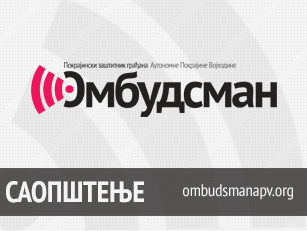 The Protector of Citizens – Ombudsman of the Autonomous Province of Vojvodina expresses a concern regarding the statement of Milenko Jovanov, a representative of the Serbian Democratic Party, claiming that the state needs to introduce so-called linguistic patrols in the regions mostly populated by members of ethnic minorities. These patrols would assess the level of their majority language skills, particularly with the Hungarians, and by doing so supposedly establish the degree of their loyalty to the Serbian state as well. Such statements might deteriorate the current inter-ethnic situation in the Autonomous Province of Vojvodina and cause fear with the members of the ethnic minority communities.
The Protector of Citizens – Ombudsman of the Autonomous Province of Vojvodina expresses a concern regarding the statement of Milenko Jovanov, a representative of the Serbian Democratic Party, claiming that the state needs to introduce so-called linguistic patrols in the regions mostly populated by members of ethnic minorities. These patrols would assess the level of their majority language skills, particularly with the Hungarians, and by doing so supposedly establish the degree of their loyalty to the Serbian state as well. Such statements might deteriorate the current inter-ethnic situation in the Autonomous Province of Vojvodina and cause fear with the members of the ethnic minority communities.
Read more: Ethnic Minority Rights: Abuse for Political Purposes





